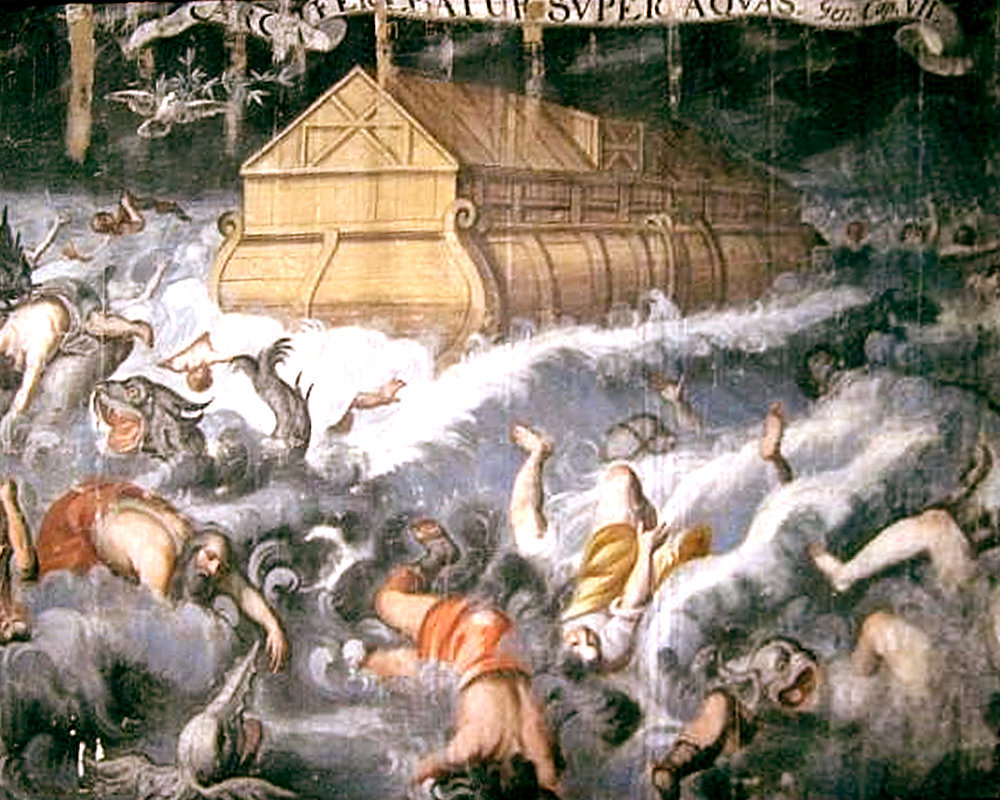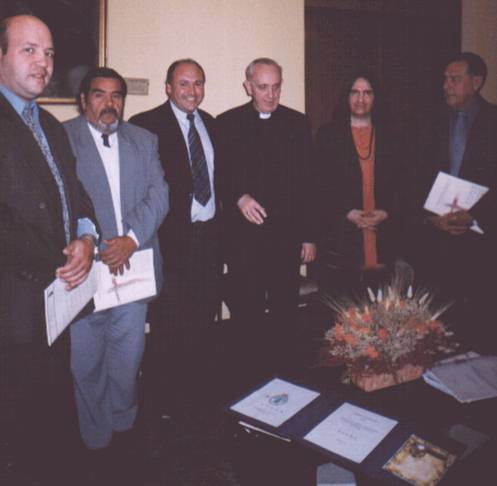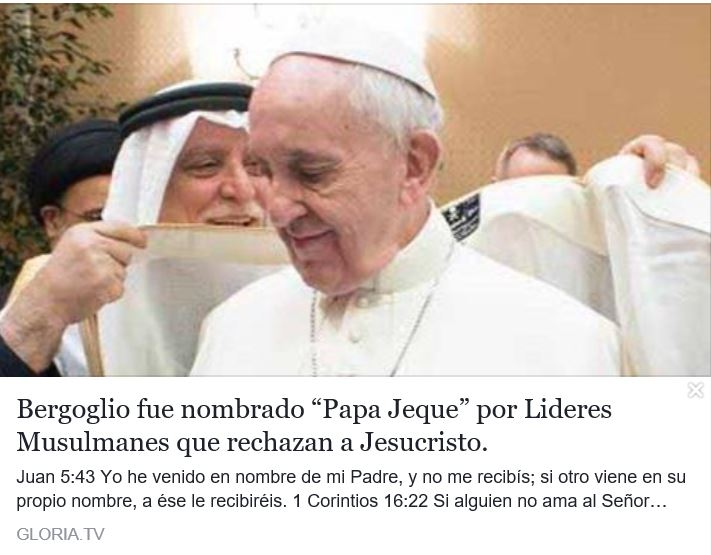The apostate sect infiltrated in the Vatican, led by Robert Prevost, defies the Redemptive Role of Jesus Christ and promotes the heresy of religious indifferentism by equating Ramadan and Lent.
Apostasy from the Faith is defined as “the complete and voluntary abandonment of the Christian religion, whether the apostate embraces another religion such as Paganism, Judaism, Mohammedanism, etc., or merely makes profession of Naturalism, Rationalism, etc.” (Catholic Encyclopedia, s.v. “Apostasy”).
Christianity is being REPLACED! Vatican equates Ramadan and Lent
The First Commandment of God
Lesson 16 from the Baltimore Cathechism
205. How does a Catholic sin against faith? A Catholic sins against faith by apostasy, heresy, indifferentism, and by taking part in non-Catholic worship.
Vatican equates Ramadan and Lent in message to Muslims - LifeSite
Mark 16:16 He who believes and is baptized will be saved; but he who does not believe will be condemned.
And this is the same apostate schismatic sect that refuses to call the Virgin Mary Co-Redemptrix and Mediatrix of all graces because they supposedly defend that Christ is the Only Mediator.
Apostate Robert Prevost Aka Leo Claims Christians and Muslims Worship Same God at Interfaith Spectacle
Prevost accepts Bergoglio's Masonic Pact with the United Nations on the Universal Masonic Fraternity
Sins against faith:
Apostasy: This is the complete abandonment of the Christian faith received in baptism; for example, Catholics who change religions or those who, without formally changing religions, have completely distanced themselves from the Catholic faith, falling into rationalism, pantheism, Marxism, Freemasonry, etc.

John 5:43 I have come in my Father’s name, and you do not receive me; if another comes in his own name, him you will receive.


Unbelievers remain children of wrath.
Of the ninth article of the Symbol
6th. Those Outside the Communion of Saints
225. Who are those who do not belong to the communion of Saints? The damned do not belong to the communion of saints in the other life, and in this life, those who are outside the true Church.
226. Who are outside the true Church? Outside the true Church are the infidels, the Jews, the heretics, the apostates, the schismatics and the excommunicated.
1 John 2: 23 No one who denies the Son has the Father. He who confesses the Son has the Father also.

"The cross will be despised and trodden under foot, Our Lord's side will be opened again" "My child, the Cross of Jesus will be hated, many priests will be put to death". The Virgin to Sister Catherine Laboure
Pope St. Pius X condemned the universal brotherhood that Bergoglio promotes in his Masonic pact in Abu Dhabi
St. John Bosco preached the truth about the "impostor" Mohamed and his false religion
“It would take too long to tell you all the stories about this famous impostor (…) Mohamed’s religion consists of a monstrous mixture of Judaism, Paganism and Christianity. Mohamed propagated his religion, not through miracles or persuasive words, but through the force of arms. [It is] a religion that favors every sort of licentiousness and which, in a short time, allowed Mohamed to become the leader of a troop of brigands. Along with them he raided the countries of the East and conquered the people, not by introducing the Truth, not by miracles or prophecy; but for one reason only: to raise his sword over the heads of the conquered shouting: believe or die.” -- St. John Bosco
Saint Augustine of Hippo
Saint John Chrysostom
The Jews when be forgiven neither by circumcision nor by other deeds, but only by Baptism
Gregory Baum, architect of Nostra Aetate and a peritus at Council Vatican II, confessed to concealing homosexual sex life BREAKING: Pagan Rituals at Vatican. Nostra Aetate’s 60th Sparks OUTRAGE
'Anathematise those who teach new doctrines' – St Robert Bellarmine
Anne Catherine Emmerich’s Prophecy: “They built a large, singular, extravagant church which was to embrace all creeds with equal rights: Evangelicals, Catholics, and all denominations, a true communion of the unholy with one shepherd and one flock. There was to be a Pope, a salaried Pope, without possessions. All was made ready, many things finished; but, in place of an altar, were only abomination and desolation.”
Daniel 11:21 And there shall stand up in his place one despised, and the kingly honour shall not be given him: and he shall come privately, and shall obtain the kingdom by fraud.
Father E. Sylvester Berry: “With the beast of Antichrist only the horns have diadems as symbols of royalty or governing power. The heads are branded with names of blasphemy. (Apocalypse, 13:1) Hence they symbolize the sins and errors that will afflict the Church . . . in this final struggle to prevent the universal reign of Christ all forms of sin and error will be marshaled against the Church . . . all errors which have afflicted the Church may be summed up in these seven: Judaism, paganism, Arianism, Mohammedanism, Protestantism, rationalism, and atheism.
St. Thomas Aquinas (1225-1274)
“It is absurd for a heretic to say that he believes in Jesus Christ. To believe in a person is to give our full consent to his word and to all he teaches. True faith, therefore, is absolute belief in Jesus Christ and in all He taught. Hence, he who does not adhere to everything Jesus Christ has prescribed for our salvation does not have any more of the Doctrine of Jesus Christ than the pagans, Jews and Mohammedans.”
Bergoglio's apostate declaration that "all religions are a path to God" has its roots in Argentina
St. Vincent Ferrer: And when the false prophet, the precursor of Antichrist, comes, all who are not confirmed will apostatize, while those who are confirmed will stand fast in their faith, and only a few will renounce Christ.”
No Greater Enemy of Our Lady Than Modern Ecumenism: Priest and Martyr Maximilian Kolbe
Prevost is an enemy of the Reign of Christ.
Matthew 10:33 But whoever denies me before men, I also will deny before my heavenly Father.
1 Corinthians 16:22 If anyone does not love the Lord, let him be accursed. O Lord, come!
Archbishop Fulton Sheen on Antichrist:
In the midst of all his seeming love for humanity and his glib talk of freedom and equality, he will have one great secret which he will tell to no one: he will not believe in God. Because his religion will be brotherhood without the fatherhood of God, he will deceive even the elect. He will set up a counterchurch which will be the ape of the Church, because he, the Devil, is the ape of God. It will have all the notes and characteristics of the Church, but in reverse and emptied of its divine content. It will be a mystical body of the Antichrist that will in all externals resemble the mystical body of Christ.
The Antichrist described by St. Hildegard of Bingen:
“Then the greater part of men will abandon the true Catholic faith and convert to the son of perdition.” “So that in comparison with his own people, the Son of God will have only a small number of faithful.”
In the Treatise on True Devotion to the Blessed Virgin, St. Louis de Montfort teaches us that the Virgin Mary will lead us in the fight against Satan, to battle against the army of the Antichrist; formed by heretics, apostates, wicked, idolaters and Mohammedans. Saint Louis adds that in these latter times, the Blessed Virgin will raise up great saints, who will extend the empire of Jesus Christ over “the impious, the idolaters and the Muslims.”













































